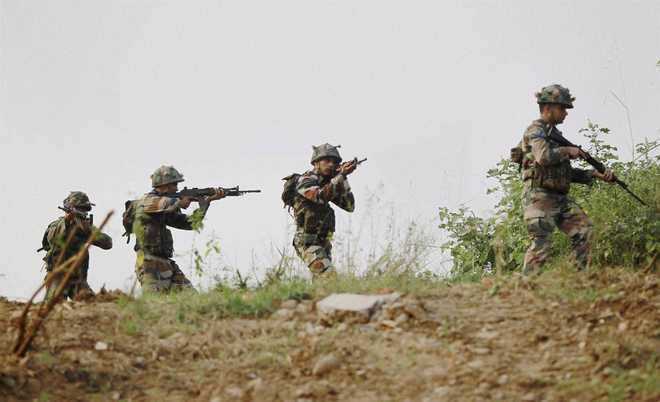The strike was codenamed ”Operation Ginger”. — Repersentational photo
New Delhi, October 9
The Bharatiya Janata Party and the Congress on Sunday indulged in a war of words after it emerged that the Indian Army conducted a deadly surgical strike on Pakistan’s military outposts in 2011 as well.Codenamed ‘Operation Ginger’, the strike is said to be the deadliest cross-border operation in which at least eight Pakistani soldiers were killed and several others fatally injured by Indian commandos.(Follow The Tribune on Facebook; and Twitter @thetribunechd)
Congress spokesman Sanjay Jha said: “It is an insult to the army and the defence establishment to say that such surgical strikes (September 29) never happened before. It is only that the then Manmohan Singh government never publicised such strikes because it was not consistent with our policy.”He said it was the responsibility of the media, the Congress and everyone else to expose the “brazen lies propagated by the ruling party (BJP) for political advantage”. On the other hand, the BJP said no covert military operation of the magnitude of the September 29 strikes had been done before.”The surgical strike was done by the army. But Prime Minister Narendra Modi provided the leadership and comfort to the army to conduct a strike of this magnitude,” BJP spokesman Syed Zafar Islam said.He said the Congress was feeling insecure due to the rising popularity of the Modi government.Operation Ginger: When Indian Army killed 8 Pak soldiersAs per a new report published on Sunday, a deadly surgical strike by the Indian Army in Pakistani territory in 2011 left at least eight Pakistani soldiers dead, with three of them decapitated.Details regarding the tit-for-tat attack that took place in the summer of 2011 have come out amid heightened India-Pakistan tensions marked by an Indian surgical strike on September 29.The Hindu newspaper citing confidential official documents, video and photographic evidences said India and Pakistan carried out “two of the bloodiest cross-border surgical strikes” killing 13 soldiers.Five of the slain soldiers were decapitated. The Pakistani soldiers took away the heads of two Indian soldiers and left behind a third badly wounded who died in hospital, the daily said.In the revenge attack, Indian soldiers brought back heads of three Pakistani soldiers, the Hindu said.Major General SK Chakravorty (retired), who planned and executed the operation as the chief of Kupwara-based 28 Division, confirmed the Indian raid but refused to discuss details.According to the newspaper, Pakistani raiders struck a remote army post in Gugaldhar in Kupwara district in Jammu and Kashmir on July 30, 2011.The attackers returned with the heads of Havildar Jaipal Singh Adhikari and Lance Naik Devender Singh of 20 Kumaon. A soldier of the 19 Rajput, who reported the attack, died in a hospital.In revenge, the Indian Army planned “Operation Ginger” — which, the daily said, turned out to be one of the deadliest cross-border raids across the LoC.The Indian operation was planned to precision. Seven reconnaissance — physical and air surveillance mounted on UAV — missions were carried out to identify vulnerable Pakistani army posts.The mission was finalised to spring an ambush on Police Chowki to inflict maximum casualty.Finally, the Indian troops launched the covert operation on August 30, 2011.About 25 soldiers, mainly Para Commandos, crossed the LoC stealthily. They planted claymore mines around the strike area.Four Pakistani soldiers, led by a Junior Commissioned Officer, walked into the ambush. Mines were detonated, grenades lobbed and they were fired at.One Pakistani soldier fell into a stream that ran below. Indian soldiers chopped off the heads of the other three dead soldiers and also took away their rank insignias, weapons and other personal items.The commandos then planted pressure IED’s beneath one of the bodies, primed to explode when anyone attempted to lift it.Two more Pakistani soldiers rushed in after hearing the explosions. They were killed by a second Indian team waiting near the ambush site.Two other Pakistani army men tried to trap the second team. But a third Indian team covering them killed the Pakistanis, the daily said.While the Indian soldiers were retreating, another group of Pakistani soldiers were spotted moving towards the ambush site. Soon they heard loud blasts, indicating the concealed IEDs had exploded, the report said.According to Indian assessment, at least two to three more Pakistani soldiers were fatally injured in that blast.The operation lasted for about 45 minutes and the Indians headed back across the LoC, carrying the heads of Subedar Parvez, Havildar Aftab and Naik Imran.The severed heads were photographed and buried. Two days later, one of the senior most Generals in the command turned up and ordered the heads to be dug up, burnt and the ashes strewn into Kishenganga river.This was done to do away with all DNA traces, the daily said. — IANS

